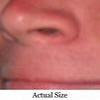The other night, me and Sharon had our monthly Atheist Meetup. It's a group of atheists in Milwaukee who met on the internet and decided to have dinner once a month as a group. We don't usually talk much about atheism, it's usually just general science talk. The best part is the age of the members range from 6 years old to well over 80. While I was talking to one of the elderly members, I mentioned that I wear my Scarlet Letter A on my white coat to identify myself as an atheist. What's more, some patients have actually recognized it as an atheist symbol and have asked me about it (so far with only one negative result). After I said this, the woman I was talking to said "What you're doing is very brave, almost heroic. Thank you."
I disagree. I'm not wearing it to be brave, and I certainly don't think I'm a hero. I wear it mostly as a conversation piece. One of the other students actually came out as an atheist and started wearing a pin as well. But to me, hero means so much more.
Travis had a post a while back about heroes, and I commented there, but I thought I'd talk about it on here. I have a good number of heroes. Getting the obvious ones out of the way, James Randi, Penn Jilette, and Mitch Hedberg are personal heroes, in the sense that I want to be more like them. But they've never really done anything "heroic." Maybe James Randi, taking on Uri Gellar, but even that is sort of a stretch. To me, being a hero means taking risks for what you believe in. The obvious choice here (although ficticious) is V from V for Vendetta. But it feels like a cop-out to pick a fictional character (badass as he is).
If I had to pick a real hero, it would have to be George Carlin. He took big risks to speak his mind. If I wear my atheist pin to work, I can't be fired because of it due to freedom of speech laws. I can be despised, but I can't really lost anything. Geroge Carlin risked his career to speak his mind, saying things no one else would say. Up until the day of his funeral, he was hated enough to have protesters and death threats (okay, no death threats at his funeral, but you get the point). He truly was a hero to me and to all the other cynical assholes out there. R.I.P.
Subscribe to:
Post Comments (Atom)

3 comments:
I mostly agree with what you stated here. George Carlin really did risk a lot for what he was trying to say. I think it's a safe assumption that comedians today would not be allowed to say half the shit they do, if not for him. What would the world be without The Aristocrats?
But you seem to be suggesting that the circumstances are what really defines a hero, rather than the intent behind the actions themselves. James Randi taking down Uri Geller wasn't a huge risk for Randi to take, that's true. But it's a safe guess that Randi would have gone after Geller even if it would have put his career at risk.
"Perhaps it's not what we do that defines us, but why we do it."
What's really lacking here is a definition of what a "hero" is. I'm being inconsistent, I know. Hero can either mean an idol (a personal hero) or the cliché "fireman hero," which I think necessarily requires risk or sacrifice. I'll stick with the second for the sake of argument. It's been said that heroes are made by circumstance, and I think that carries some weight. This is going to be a stretch, but I don't think Randi is heroic (in the second sense) because he's doing what he should be doing. He has nothing to risk by taking down Geller, therefore he should be doing that. If I'm standing in a boat holding a lifejacket, and I see someone drowning, tossing them the jacket doesn't make me a hero. It's almost required for me to give them the jacket. But if I were swimming next to them, and me giving them my lifejacket puts my own life in danger, that would be different. In either case, my intent is to save their life. But in the second one, my risk makes the act heroic. In the same sense, Randi risks nothing and should not be called a hero (for the sake of argument). Carlin risked his career and has earned the right to be called a hero.
I guess we'll just have to split the definition two ways. I recently started rereading the Ender's series by Orson Scott Card. You've probably heard of it but I know you can be rather pitted against science fiction. In the introduction, the author mentions Isaac Asimov and the philosophies he expressed in his stories as a huge (if not the defining) inspiration for his story. The subject of what really makes a hero is very widely explored though. Not so much in the first book, but very much so in the second book. If you have free time (which you probably don't) it's worth a look. The first book is a very very quick read, the second takes a bit longer to trudge through.
Post a Comment